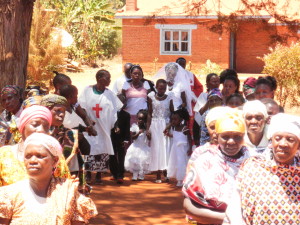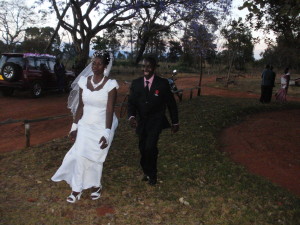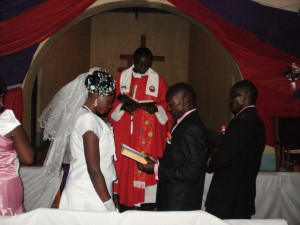Moses is Married! – The Practice of Dowry Explained
By Tanzania Country Manager Edward Mgeni
Our friend and Global Volunteer program assistant Moses Kifyasi has married Zamuda Mgaya. On this occasion, it is interesting to describe our practice of a dowry before a marriage can be permitted. This is my experience as a life-long villager in Pommern.
When deciding a dowry in this community [The Hehe and Bena], the practice is of very great importance when a man is to marry a wife. When the gentleman plans get to married, he first reports to his parents about the matter for approval. The parents in turn invite a number of relatives and very close friends to discuss the matter and advise the gentleman. When the family members at the meeting support the idea, it entails that the betrothed and her family members are accepted to form a big family altogether.
 A letter of application gets written to the girl’s parents with some Tanzanians shillings in the envelope. Two people[a man and a lady] gets chosen to take the letter to the family. This letter is never posted. The money can be between 20, 000/= to 50, 000/= . The “applicant’s” current financial position determines the application fee. When the girl’s parents receives the letter, they first ask their daughter at a family level to confirm the matter. Usually at this stage letters gets confirmed. Then the parents calls their close relatives and friend and to inform them over a calabash of bamboo or corn liquor.
A letter of application gets written to the girl’s parents with some Tanzanians shillings in the envelope. Two people[a man and a lady] gets chosen to take the letter to the family. This letter is never posted. The money can be between 20, 000/= to 50, 000/= . The “applicant’s” current financial position determines the application fee. When the girl’s parents receives the letter, they first ask their daughter at a family level to confirm the matter. Usually at this stage letters gets confirmed. Then the parents calls their close relatives and friend and to inform them over a calabash of bamboo or corn liquor.While other people think that dowry giving is purchasing human beings, it is not so. Our tribe culturally understands that dowry is to be given. This is our understanding: How do you know that one is serious with taking one’s daughter with simple word s such as “ I love your daughter” and “I would like her to marry me”? Dowry is a taste question and if he gives the dowry, we know he is serious, and thus shall value her and take care of her.
Many marriages last long in Iringa, however these days, there are various challenges due to education, outsiders’ influence and money economy. Moses gave cows and was allowed to get married. I paid and I got married. Many other still do and so forth. Other tribes with many cows give more cows. Wow !!!This sounds strange, eeh! This is how it is, one time the youth representative in the parliament raised the abolishment of the dowry issue to the parliament for discussion, the decision was: “Let those who are asking bare their own daughters to give free – not our daughters, “ the members of the parliament concluded.





Leave a Reply
Want to join the discussion?Feel free to contribute!